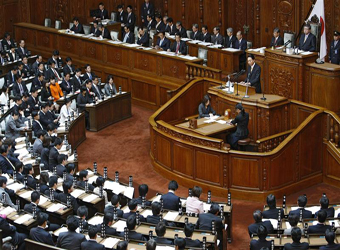The lower house of Japan’s parliament which is mostly comprised of opposition lawmakers passed the bill on Friday to enable Tokyo to provide USD 7.6 billion insurance cover for every tanker importing Iranian crude, instead of seeking such cover from the EU.
On January 23, under pressure from the United States, EU foreign ministers approved new sanctions against Tehran, banning oil imports from Iran across the European Union, which also includes extending insurance coverage for tankers carrying Iranian crude.
Japan, which in 2011 imported nine percent of its oil from Iran, has become exempt from the US unilateral sanctions against Iran’s oil industry by reducing its crude imports from the Islamic Republic.
The world’s third largest economy did not cease the purchase of Iran’s crude over concerns regarding the likelihood of a surge in the imported oil prices and its subsequent negative effects on Japan’s economic development.
The US has made exemptions for 18 nations, including 10 European Union countries, Japan, India, South Korea, Sri Lanka, Malaysia, Taiwan, Turkey, and South Africa, from sanctions on the Iranian crude oil.
Tokyo had repeatedly demanded that Washington exempt the country from implementing the embargoes.
“Japan needs the Iranian oil as part of its oil supply. So the government is creating a framework to allow continued purchases despite the EU sanctions,” said Akio Shibata an expert with Japan’s National Resource Research Institute.
“Japan imports about 350,000 barrels of crude oil per day from Iran. If we lost Iran’s oil supply, we would have to ask Saudi Arabia and Qatar to replace it. But we do not know if they have the capacity to provide it,” he added.
Shibata warned that the embargoes against the Iranian oil “will result in rising crude oil prices. In addition, it might cause Japan’s economy to stall, especially after these emerging signs of the post-earthquake recovery.”
Japan used to get 30 percent of its electricity from nuclear power before last year’s quake and tsunami that wrecked the Fukushima plant, spewing radiation and forcing mass evacuations.
The United States and the European Union have imposed tough financial sanctions as well as oil embargoes against Iran since the beginning of 2012, claiming that the country’s nuclear energy program includes a military component.
Tehran refutes such allegations, noting that frequent inspections by the International Atomic Energy Agency have never found any diversion in Iran’s nuclear energy program toward military purposes.


